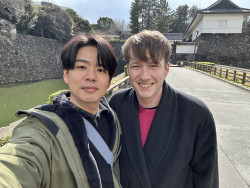
Originally published on metropolis.co.jp on August 2013
It’s common for me to receive emails from friends saying “Your Japanese must be fluent by now.” I don’t often reply to these comments. How can I put into words that after XXX years I’ve progressed more through reading books than from actual communication with Japanese people?
It’s not because I haven’t tried. It’s difficult to say “Nobody wants to talk to me in Japanese” without sounding like you’re lazy, a loser—or both. Yet my Japanese teacher used to respond with surprise when I completed a single page of homework. She acted as if I’d studied with a Rocky–style training regimen, when I’d actually done about the same amount as my own five-year-old students of English. I’ve been asked multiple times why I even study Japanese.
“It’s too difficult.”
“Don’t waste your time!”
Before this gets too one-sided, I’ve also felt the frustration of conversation with non-natives in my home country. I understand the feeling of not knowing exactly which words to choose or how fast to speak. I can appreciate that—if you don’t have an otaku-style interest in foreign lands—struggling to communicate is a hindrance to humor, insight and other essential things that make conversation interesting.
Yet the dismissal of efforts here is unique to Japan. It’s fair to say a high percentage of friends that expats make in Japan are those with an interest in foreign cultures who are often bilingual. While great for friendship, these people often represent a barrier to learning Japanese. There is nothing more de-motivating than having Japanese questions answered in English—or translated into English then answered. Then there’s the unintentional patronizing, the cheers of success for reading a single word in katakana.
The one thing that people are very keen to say to me in Japanese is that my Japanese is very good. It’s not malicious, but it’s an unintentional backhanded compliment. Though done with such sincerity it’s hard to get angry about it, it’s nevertheless demoralizing for those wanting to integrate themselves into another culture. It relates to a deeper sense of separation from the other—the foreigner. On the surface level we smile, but deep down the frustration builds. Even after 10-20 years we still expected to be flattered rather than given a chance to have an open conversation in another language.
Many of my conversations have taken place in bars, and it often hasn’t worked out. One oft-repeated scene is, conversely, a shocked reaction that I’m not better at Japanese considering the time I’ve spent here.
True as that may be, emphasizing that point and refusing to communicate in Japanese after pointing it out doesn’t do much good for my studies. Sometimes my questions in nihongo are shut down with the retort that the person “doesn’t speak English.” Sometimes there’s a jokey call around the room: “Anybody here speak English?” That’s fine, but I can speak Japanese well enough to have a basic conversation—if the person is willing. And therein lies the problem: few are (in Japanese). In English my entire career is based upon the opposite.
Other practice forums exist than friendly local bars and restaurants, but concepts such as language exchanges or foreigner-friendly meetings may as well just be renamed “free English lessons.”
Those able to impress with their ability can sidestep these issues and converse with ease. So how do we get past that challenging middle step?
Finding someone with the same hobbies and interests as you works to a degree. But it’s limiting—people are who they are, not what they like.
Another option is finding someone who cannot speak English and has no interest in learning it—quite a rarity.
Perhaps the only option is to go underground and return to the books, and surface someday fully charged, like a linguistic Super Saiyan.
Have something to say about this story? Share your comments below.








